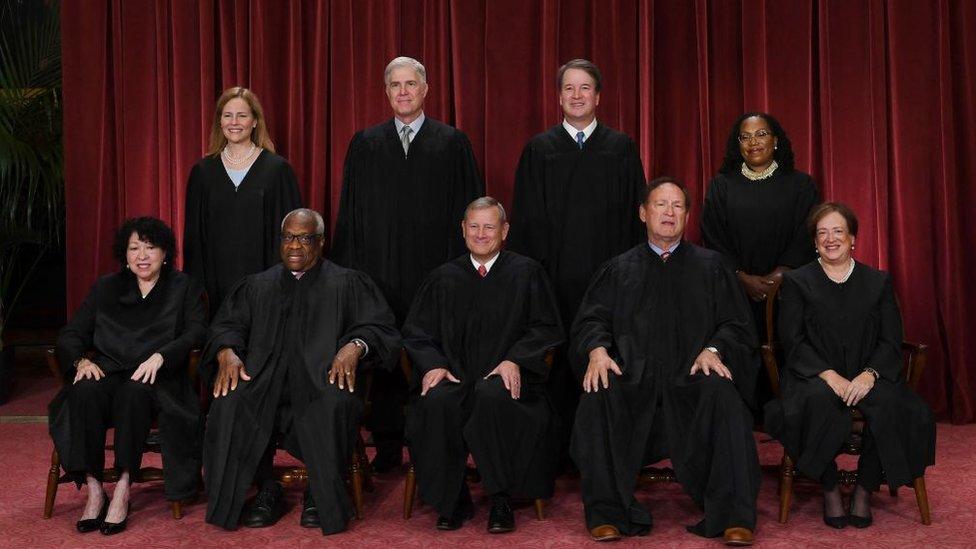Supreme Court: Political row brews over Kennedy's successor
- Published
"We have a very excellent list... of tremendous people"
A political battle is brewing over the replacement of Supreme Court Justice Anthony Kennedy, who announced his retirement from the US top court.
Mr Kennedy, 81, retires on 31 July, giving President Donald Trump a chance to cement a conservative majority on the high court for decades to come.
Democrats say the Republican-controlled Congress should wait until after mid-term elections to confirm a successor.
But the Republican Senate leader says a vote will take place by the autumn.
Senate Majority Leader Mitch McConnell, who has already cancelled a scheduled recess for the upper chamber in August, suggested Mr Kennedy's replacement would be confirmed before November's mid-term elections.
"The Senate stands ready to fulfill its constitutional role by offering advice and consent on President Trump's nominee to fill this vacancy," he said on Wednesday.
His comments came after President Trump said the process to find a replacement would "begin immediately".
Mr Kennedy made the announcement earlier on Wednesday, saying he wanted to spend more time with his family after 30 years on the top court.
Although he was a conservative justice, Mr Kennedy sided with liberals on certain key votes, including abortion and gay marriage.
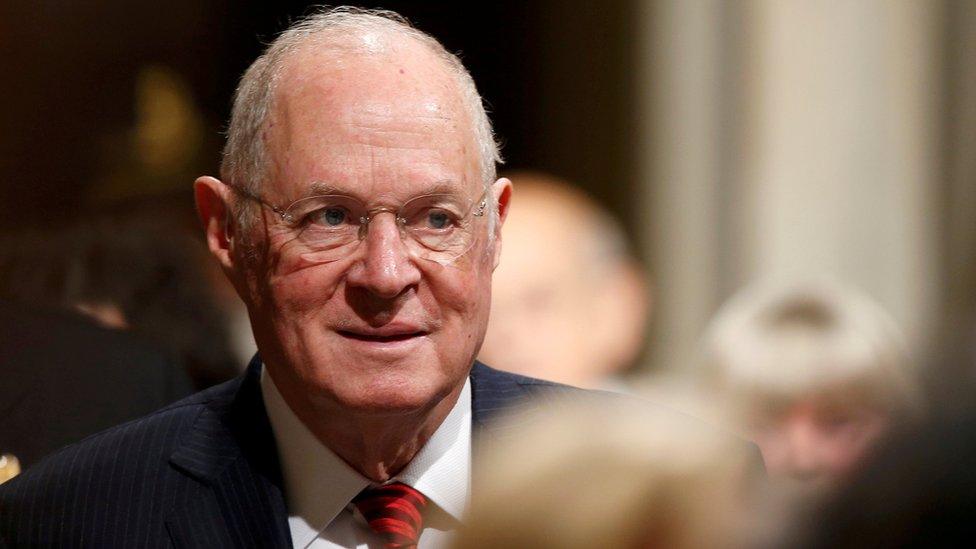
Mr Kennedy has sided with liberals on many decisions
Why are lawmakers divided?
The Senate, which votes to confirm Mr Trump's nominee, is currently controlled by Republicans with a slim 51-seat majority. But that could change after mid-term elections in November.
Speaking at the rally in Fargo, North Dakota on Wednesday evening, Mr Trump warned his supporters that Democrats would "rewrite the Constitution any way they want" unless Republicans could quickly confirm a conservative justice.
"We have to pick one that's going to be there for 40 years, 45 years," he said of Mr Kennedy's successor.
The president has promised to draw names from the same list of 25 conservative candidates, external from which he picked Justice Neil Gorsuch in February last year.
When asked by reporters on Wednesday if he would wait until after the mid-term elections to nominate a successor, Mr Trump said: "I think you want to go as quickly as possible", the Associated Press reported, external.
The long-simmering tensions over Supreme Court picks became a political flash point in 2016 when the Republicans successfully blocked President Barack Obama's nominee, Merrick Garland, to replace the late Justice Anthony Scalia.
At the time, Republicans said it was unfair to confirm a judge during an election year. Democrats are now pointing to that argument in an effort to halt the confirmation of Justice Kennedy's replacement.
Earlier on Wednesday, Mr Schumer in a televised speech on the floor of the Senate called for delaying a confirmation vote until after the mid-terms, adding that "anything but that would be the absolute height of hypocrisy" from Republicans.

Allow X content?
This article contains content provided by X. We ask for your permission before anything is loaded, as they may be using cookies and other technologies. You may want to read X’s cookie policy, external and privacy policy, external before accepting. To view this content choose ‘accept and continue’.


How important is a Supreme Court pick?
The Supreme Court plays a key role in American life and is often the final word on highly contentious laws, disputes between states and the federal government, and final appeals to stay executions.
Rather than serving fixed terms, the justices serve for life unless they decide to retire. This makes their appointments particularly significant.
This week the court upheld Mr Trump's travel ban which covers people from several Muslim-majority countries, in a 5-4 conservative majority ruling. Earlier this month it ruled in favour of a baker in Colorado who refused to make a wedding cake for a gay couple.
"Hopefully we are going to pick somebody who will be as outstanding," Mr Trump told reporters at the White House shortly after Justice Kennedy's retirement was announced.
Vice-President Mike Pence said on Twitter that the president would nominate "a strong conservative, in the tradition of the late Justice Scalia" who would uphold the "God-given liberties" of the constitution.
Allow X content?
This article contains content provided by X. We ask for your permission before anything is loaded, as they may be using cookies and other technologies. You may want to read X’s cookie policy, external and privacy policy, external before accepting. To view this content choose ‘accept and continue’.
Mr Kennedy, who is the second-oldest justice on the nine-member US Supreme Court, earned a reputation as a swing vote conservative who supported liberal arguments on key decisions, including the 5-4 rulings that decided same-sex marriage and upheld abortion rights.
As a result, news of his retirement has raised fears among pro-choice groups that access to legal abortions in several states could be under threat.
Mr Trump, during his presidential campaign, vowed to attempt to overturn Roe v Wade, the 1973 decision legalising abortion throughout the US.
"If we put another two or perhaps three justices on, that is really what will happen," Mr Trump said during an October 2016 debate with Hillary Clinton.
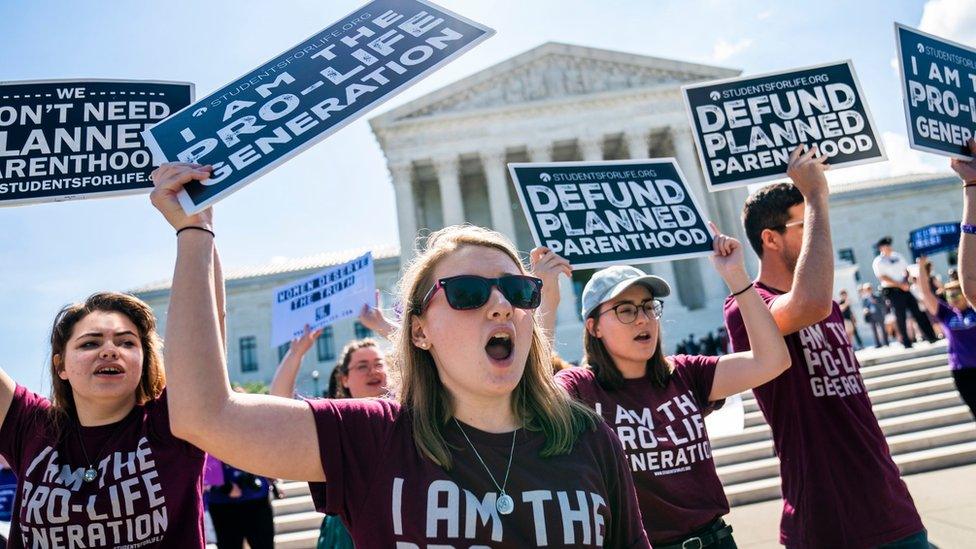
Anti-abortion activists say Justice Kennedy's retirement is a "pivotal moment"
Who is Anthony Kennedy?
Mr Kennedy, who was raised in California, was nominated by President Ronald Reagan and began his term in 1988.
He voted conservative on issues of campaign finance, voting rights and gun rights.
Mr Kennedy penned the Supreme Court's first major gay-rights decision, external in 1996, protecting LGBT Americans from discrimination.
In 2015, he authored the landmark opinion which gave LGBT citizens the right to marry, writing: "They ask for equal dignity in the eyes of the law and the Constitution grants them that right."
As a justice, he routinely favoured personal liberty and the limiting of federal power.
Mr Trump said Mr Kennedy had "displayed great vision" and "tremendous heart".
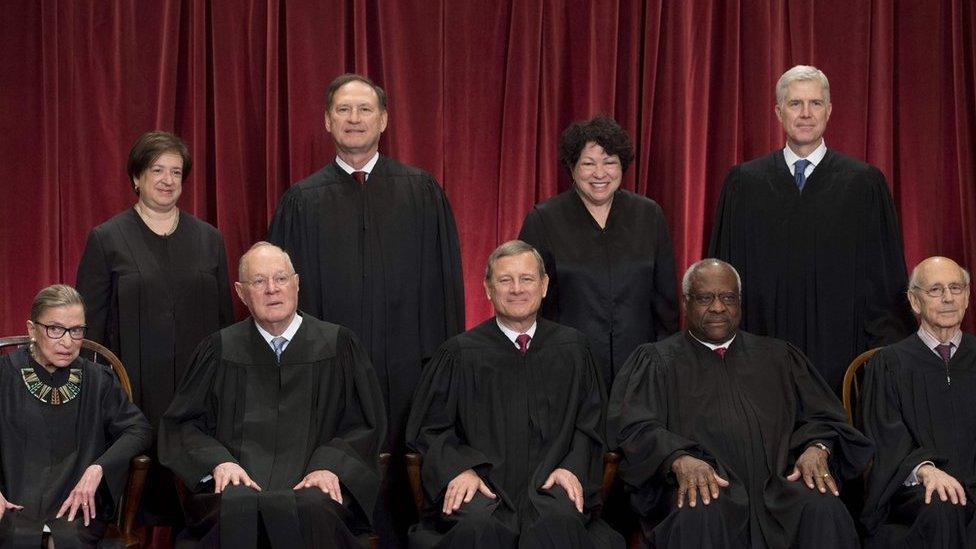
Mr Kennedy (second from left in front row) is the second-oldest justice on the nine-member court
The White House also released a statement thanking Mr Kennedy for his 30 years of service as a "tireless voice for individual rights".
"His words have left an indelible mark not only on this generation, but on the fabric of American history."
Who are the contenders?
From the list of 25 judges that Mr Trump has said he would draw from, US media report several front runners.
Most candidates are appointees of President George W Bush, and only one of the supposed top-picks is a woman.
Brett Kavanaugh, who is at the top of most lists, is Washington, DC appeals court judge and was a former clerk to Mr Kennedy.
He represented Mr Bush during the Florida vote recount in 2000 that won Mr Bush the presidential election.
But the American Bar Association recently downgraded his qualifications based on a lack of experience and concerns over partisan bias.
Amul Thapar, a Kentucky judge handpicked by Mr McConnell and Amy Comey Barrett, a former professor at Catholic university Notre Dame, are other likely nominees.
- Published27 June 2018
- Published19 September 2020
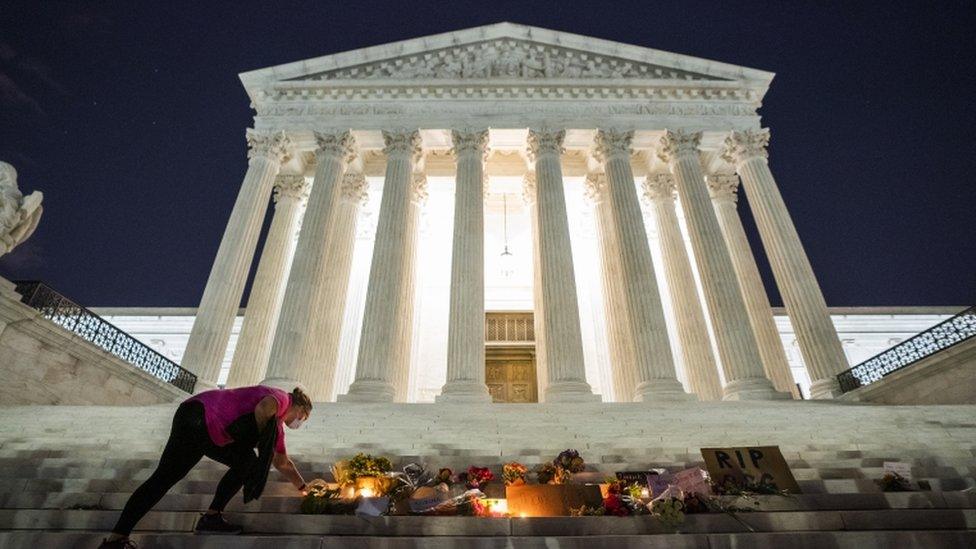
- Published27 June 2018
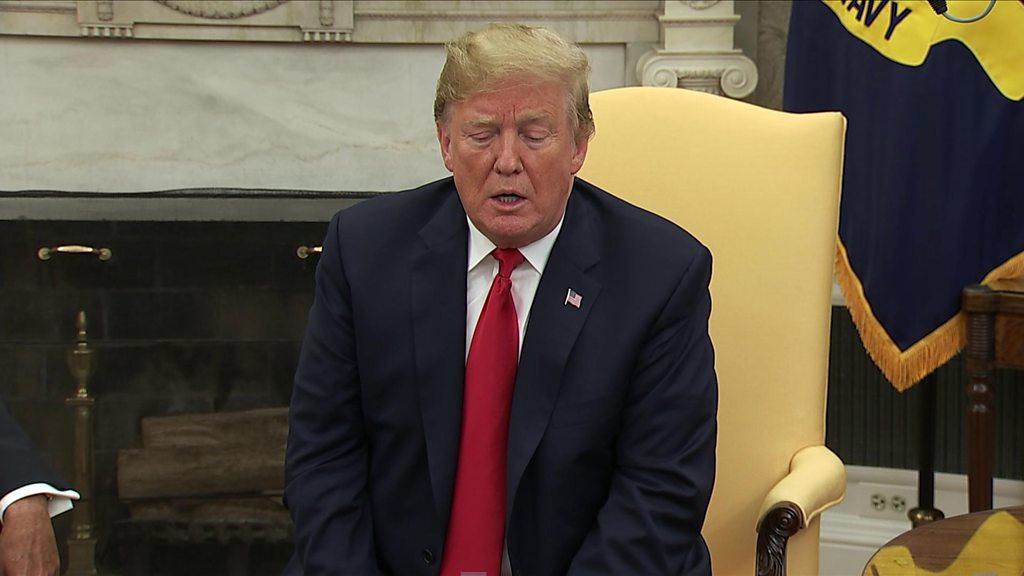
- Published8 February 2024
